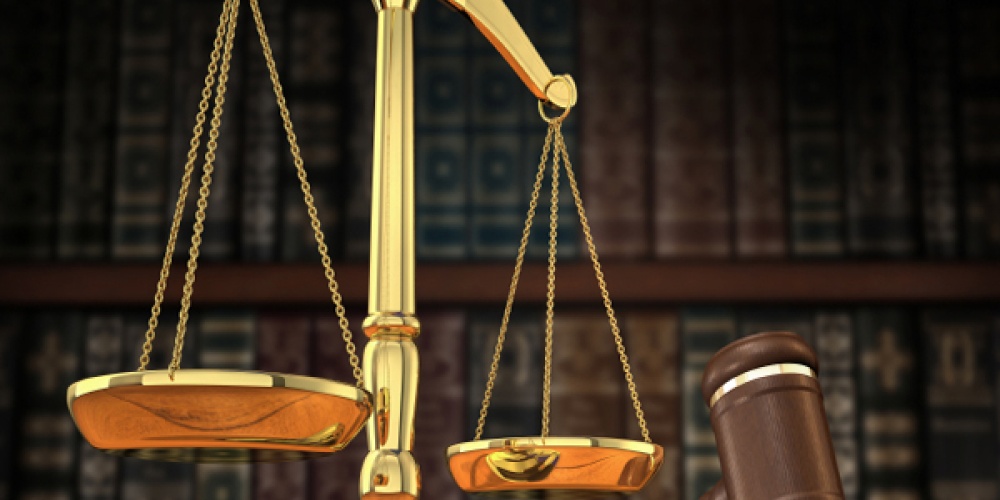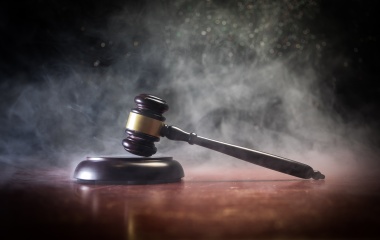
This week's d'var Torah is dedicated in honour of the upcoming wedding of Estie Roz and Avner Zeifman. May they share much happiness and built a bayit ne'eman b'yisrael. Mazal-tov to the extended families.
The hallmark of democratic societies is a strong, fair, and impartial judicial system; without one, anarchy rules. In many ways, the dispensing of justice is the fundamental difference between first-world and third-world countries, where corruption and graft is often the norm, and where disputes are likely to be settled by force.
"Justice, justice you shall pursue, so that you can live and inherit the land that G-d, your Lord, is giving you" (16:20). This link between justice and living in the land of Israel is highlighted on Shabbat Chazon, when destruction and exile are foremost in our thoughts; the haftorah ends with Isaiah's stirring words that "Zion will be redeemed through justice, and its returnees by righteousness". The privilege of dwelling in the land of Israel is dependent on the integrity of our justice system.
Sefer Devarim, which is the book of preparation for entry to the land of Israel, opens with Moshe commanding the people to appoint judges, and exhortation those judges to be fearless as they dispense justice equally; to rich and poor, powerful and weak. The appointment of judges was the prelude to Har Sinai, when Yitro exhorted Moshe to appoint judges who are "G-d-fearing men, men of truth, who hate graft" (Shemot 18:21). And in the immediate aftermath of Sinai is Parshat Mishpatim, the code of civil behaviour. As Rashi (21:1) notes, these laws, too, come from Sinai.
The formal command to appoint judges in our parsha follows on the heels of the mitzvah of aliyah laregel, the mitzvah to spend the holidays of Pesach, Shavuot, and Sukkot in Jerusalem. Such togetherness at the holidays serves to unite the people in joy. But a justice system must unite the people during times of dispute and dissension, as people accept the rule of law, even if it rules against them.
"And you shall judge the people a righteous judgment". The clear implication is that one can have a non-righteous judgment, that--while cloaked in official justice--is, in reality, a travesty of the very justice they are meant to uphold (the recent ruling of a court in Cologne banning brit milah comes to mind).
The first requirement for a righteous justice system is that it be accessible--"judges and police you shall appoint in all your cities". The Talmud (Sanhedrin 2b) explains that a city with a population of as few as 120 people was to have a full court system of 23 judges. The Torah follows with a warning against the dangers of favouritism, bias, and accepting bribes--even if the bribe is given to ensure that the judge rules fairly.
The Torah is well aware that even the most pious and righteous are impacted by money and susceptible to bias. It specifically tells us that, "bribery blinds the eyes of the wise and perverts the words of the righteous (tzadikim)". Our sages went to great lengths to ensure that they would not fall victim to bias (see Ketuvot 105b), going so far as to disqualify themselves from a case because one of the litigants had said good morning to them earlier in the day. This teaches not only the difficulty of impartiality, but the power and impact that saying "good morning" can have.
Yet there is another way in which the law of strict justice can be unjust. Law requires total impartiality, the ability to ignore social factors, upbringing, extenuating circumstances; in short, the law is unconcerned with the human impact of the case--it must "pierce the mountain" (Sanhedrin 6b). And this is how the law must operate; otherwise, judges risk being social engineers and politicians, instead of jurists.
But law can be unfair, and ultimately, unjust. Judaism has a second dimension to law, that of lifnim mesurat hadin, a term difficult to translate. Lifnim mesurat hadin expands the areas of which the law should be cognizant, taking into consideration such factors as intent, wealth and preserving dignity--things the law must ignore. Whereas strict justice demands that an employee who makes a mistake must pay for the damages, in most societies employers bear the responsibility for actions carried out under their watch.
The Talmud, in fact, recommends that strict justice never be used in practice, recommending a system known as pesarah, a form of lifnim mesurat hadin.
The notion that justice extends beyond the law is reflected in the dual nature of our Sanhedrin. Unlike the very thick wall dividing the judicial and legislative branches in the American system, Judaism sees the role of Sanhedrin as encompassing both the judicial aspect of final arbiter and interpreter of the law, and the legislative aspect of initiating and instituting decrees and ordinances to ensure that the law reflects current human reality.
The Torah tells us that we are to run away from falsehood, medvar sheker tirchak. Even better is to run towards justice; tzedek, tzedek tirdof.



